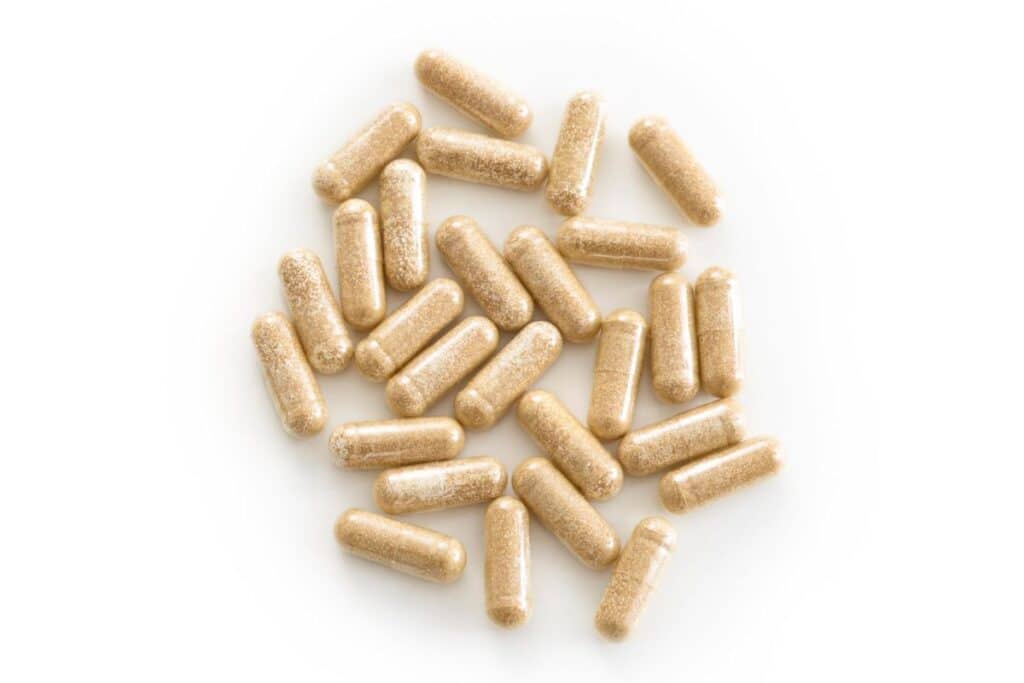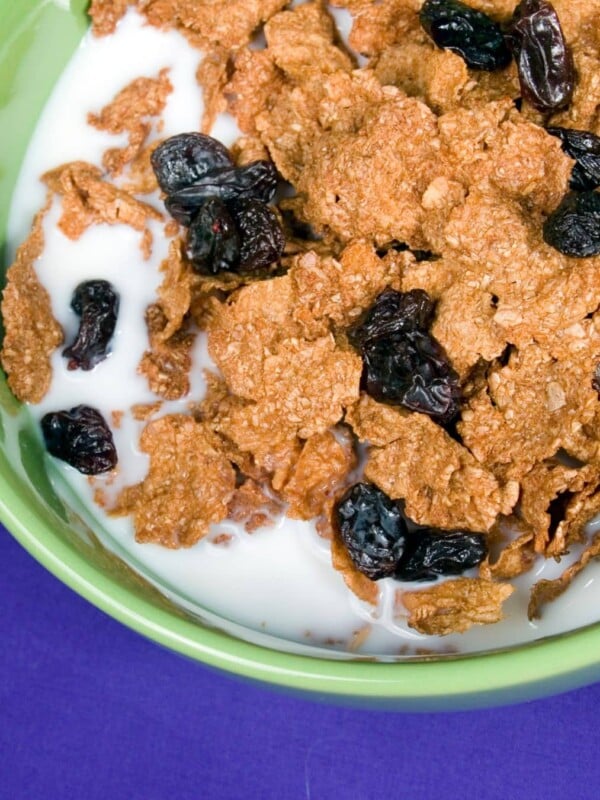This post may contain affiliate links. Please read our disclosure policy.
Unbloat: reviews of the science, myths explored, and claims busted.
Hi – I’m Jamie! As a Registered Dietitian, I am often asked about the latest supplements on the market. And honestly: I don’t think I’ll ever run out of supplements to review.
Today we’re getting into a comprehensive Unbloat review. Does Unbloat work?
In this article, I will provide you with an in-depth review of Unbloat to help you make an informed decision.

What is Unbloat?
Unbloat is a dietary supplement marketed towards anyone looking to reduce bloating and improve digestion. If you’re struggling with GI symptoms right now, I feel for you, because it’s uncomfortable and annoying! It’s only natural to search for a solution.
This product is the brainchild of Dr. Shilpa Mehra, a Board-Certified Gastroenterologist. Unbloat claims to reduce bloating and improve overall gut health with a blend of natural ingredients such as ginger, peppermint, fennel, and turmeric.
They also claim that their product can do other things like improve your skin complexion, enhance your immune system, and detoxify the small intestine.
The ingredients in Unbloat capsules are said to have anti-inflammatory properties and aid in digestion by reducing gas and bloating (we’ll take a deep dive into the science – hold tight).
Let’s cover all of our bases first though and explain exactly what is happening when you’re feeling bloated.
Understanding Bloating
Bloating is quite common…but what is happening?
First let me start by saying: some bloating is normal. Not all bloating is a problem that needs to be addressed, especially if it’s only occasional bloating.
Bloating can happen for a few different reasons. One of the most common contributors to bloating is the build-up of gas in the digestive system.
You may notice more bloating after eating certain foods like beans, lentils, broccoli, cabbage, onions, and carbonated drinks. Other causes may include constipation, eating large meals, or swallowing air while eating or drinking.
Certain conditions like irritable bowel syndrome (IBS), hormonal fluctuations, or food intolerances can also lead to persistent bloating. If you have changes in your digestion and bloating as you move through your menstrual cycle, that’s pretty common too.
Some bloating is just a part of digestion sometimes, but it’s worth exploring deeper if your bloating is uncomfortable, painful, and persistent .
Understanding the root causes of bloating is important to determine if a supplement like Unbloat could potentially have a positive effect on your symptoms.
Ingredients of Unbloat and their impact on bloating
The Unbloat formula claims to be a comprehensive solution and has a mix of probiotics, prebiotic fiber, digestive enzymes, nutrients for bowel support, a bloat-fighting herbal formula, and other nutrients like folate and magnesium. Let’s break down how each of these ingredients potentially affects bloating.
Probiotics
Probiotics are live bacteria and yeasts beneficial for gut health, they’re the “good bacteria”. Taking a supplement may help restore the natural balance of bacteria in the gut, potentially reducing gas and bloating associated with a disrupted gut microbiome.
Unbloat has 25 billion CFU of a mixture of strains of probiotics. This is a generous dose of probiotics and it may help to diversify the community of healthy bacteria living in your digestive tract to produce a healthier gut microbiome
However, the research on this is still unfolding. Some studies have found no benefit from a probiotic supplement.
Also, it is important to note that for some people, probiotics may actually cause bloating, especially at the beginning of taking a supplement.
Prebiotics
Although the word prebiotics is very similar to probiotics – what we just covered – they’re not the same thing.
Probiotics are the living organisms. Prebiotics are the fibers in our foods that the probiotics can digest (aka prebiotics are probiotic food!). There are several different kinds of prebiotic fibers.
Because prebiotics can help to support a healthy and diverse gut flora, they may potentially reduce bloating symptoms. But, they’re also a double-edged sword, because for some people, a prebiotic supplement can cause bloating.
It’s also important to chat about dose; many of the studies that are looking at the possible benefit of prebiotic supplements are using 3-5 grams of fiber a day; Unbloat has a lot less than that with 275 mg per dose.
Enzymes
Digestive enzymes assist in breaking down food into nutrients. Our body makes enzymes, but we can also take them as a supplement, such as Beano, which contains the Alpha-galactosidase enzyme, or Lactaid which contains the Lactase enzyme.
If you’re not able to digest these specific compounds, having more of the enzymes that digest them might reduce side effects, such as gas and bloating.
In Unbloat, the amount of active enzyme is unclear, so it is hard to know if the “dose” will make a big difference, or if it is too small to make a difference.
Vitamins and minerals
Unbloat contains nutrients for bowel support, folate, and magnesium.
Folate is a B vitamin; folic acid is the synthetic form of folate. This nutrient is important for the growth of new cells (as happens every day in the digestive tract) and is also helpful for reducing inflammation.
Magnesium has 100s of roles in our body, including a crucial role in the support of having regular bowel movements, which can prevent constipation-related bloating.
Herbals
The bloat-fighting herbal formula in Unbloat includes ginger root extract, peppermint, milk thistle, fennel seed, spirulina, and turmeric. These herbal remedies are commonly used for things like upset stomach and gastrointestinal tract issues, so these ingredients aren’t too surprising.
Ginger and peppermint can soothe the digestive tract and reduce gas build-up.
Fennel seeds have traditionally been used for a variety of digestive issues, including bloating.
Milk thistle is commonly used to support the liver’s ability to detoxify. It has also been studied as a possible treatment for IBS-C, but at a dose that is higher than what is included in Unbloat. BTW – if you’re allergic to ragweed, milk thistle may also cause you to have an allergic reaction.
Spirulina, a type of blue-green algae, is rich in B vitamins and iron which can aid overall digestive health.
Turmeric, with its active component curcumin, has anti-inflammatory properties that can help reduce any inflammation-related bloating.
Other ingredients
Last but not least, Unbloat contains two “bowel support” ingredients: sodium alginate and L-leucine.
Sodium alginate is extracted from brown seaweed and acts like mucus to soothe and protect the gut wall. Alginates are also used to treat GERD and heartburn.
L-leucine is an essential amino acid, which means that it is a building block to make bigger proteins in our body that we cannot make ourselves. While most people who are taking this amino acid as a supplement are working towards muscle gains, L-leucine may help to reduce inflammation.
TLDR: the ingredients in Unbloat may reduce bloating and improve digestion…or they may make things worse (at least at the beginning). The effectiveness of these ingredients may vary from individual to individual based on their specific digestive health needs and overall lifestyle habits. I said it before and I’ll say it again; gut health is not one size fits all.

Does Unbloat really work?
While the ingredients in Unbloat could potentially help alleviate bloating and improve digestive health, it’s important to remember that gut health is not a “one size fits all” situation.
What works for one unique body may not work for another, and this is especially true with Unbloat, given its wide variety of ingredients.
For some individuals, this combination of ingredients might be overwhelming and not necessarily address the root cause of their bloating.
Reviews of the Unbloat supplement offer a mixed picture of its effectiveness. The reviews on Amazon are less positive than those on Unbloat’s website, suggesting that the experiences of users vary significantly.
This divergence in reviews may reflect individual differences in digestive health needs, lifestyle habits, or the cause of bloating. In my experience, the Amazon reviews are typically a bit more accurate than the official website reviews, since the brand cannot moderate those. It’s clear individual results vary.
Another aspect to consider is that Unbloat is a proprietary blend. While this protects their secret formula, it also means that the exact amounts of some ingredients are not disclosed.
This lack of transparency makes it challenging to evaluate if the doses of these ingredients are sufficient to have a clinical impact.
As always, it is recommended to consult with a healthcare provider before starting any new supplement regimen. They can provide guidance based on your specific health needs and circumstances. Understanding your own body and the root cause of your bloating is the first step towards finding effective solutions.
No third-party review
It’s important to note that Unbloat, like many dietary supplements available online, is not third-party reviewed for quality.
Third-party testing is an essential component of supplement safety, ensuring that a product contains the ingredients as listed and does not contain any harmful substances. This is because the Food and Drug Administration does not regular dietary supplements.
Without this independent verification, there is some degree of risk associated with any product’s quality, safety, and effectiveness.

How much does Unbloat cost?
A 30-day supply of Unbloat is just under $45. But, if you subscribe to monthly delivery or bundle several months’ supply in one purchase, you can save up to 24% through the manufacturer’s website.
According to their site, they’re meant to be used long term for best results, so plan to budget this cost in regularly if you’re going to use it.
Wrap Up
Unbloat is a bloating supplement that aims to alleviate bloating and support digestive health through a blend of probiotics, prebiotic fiber, digestive enzymes, and bloat-fighting herbs.
Just like any other dietary supplement, its effectiveness can vary significantly from individual to individual, and it is not a “one-size-fits-all” solution.
Unbloat offers a comprehensive collection of ingredients with many possible benefits for healthy digestion, but we also don’t know the exact dose for several of them, which makes it hard to know if the dose is enough to have a positive impact on your belly.
Gut health supplements are especially tricky, because the solution to digestive discomfort depends on so many factors. Plus, if you’re experiencing serious GI symptoms, you need to make sure you’re also working with a GI doctor in case there’s an underlying medical condition.
As a dietitian, the absence of third-party quality testing is definitely a concern.
If you found this review helpful and want to stay in the loop for more reviews like this one, I invite you to follow me on Instagram. Not only will I be reviewing other health and wellness products, but I also share healthy, easy-to-make recipe ideas. Come join the community and let’s continue our health journey together!













